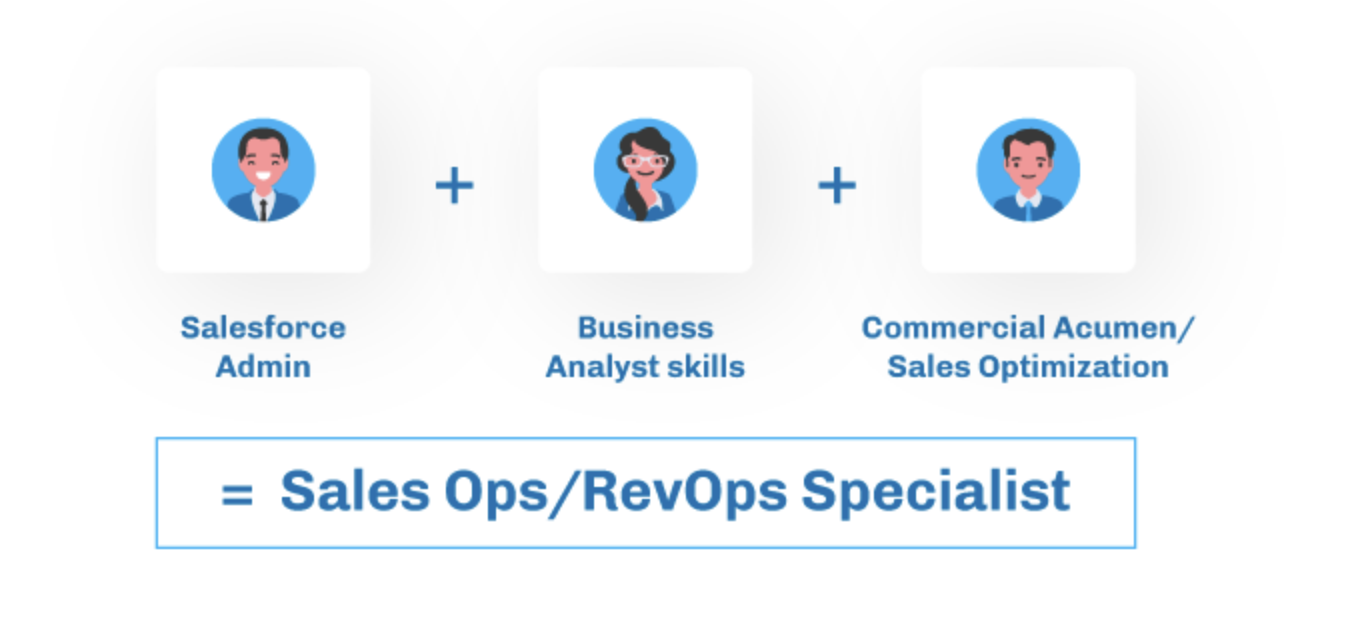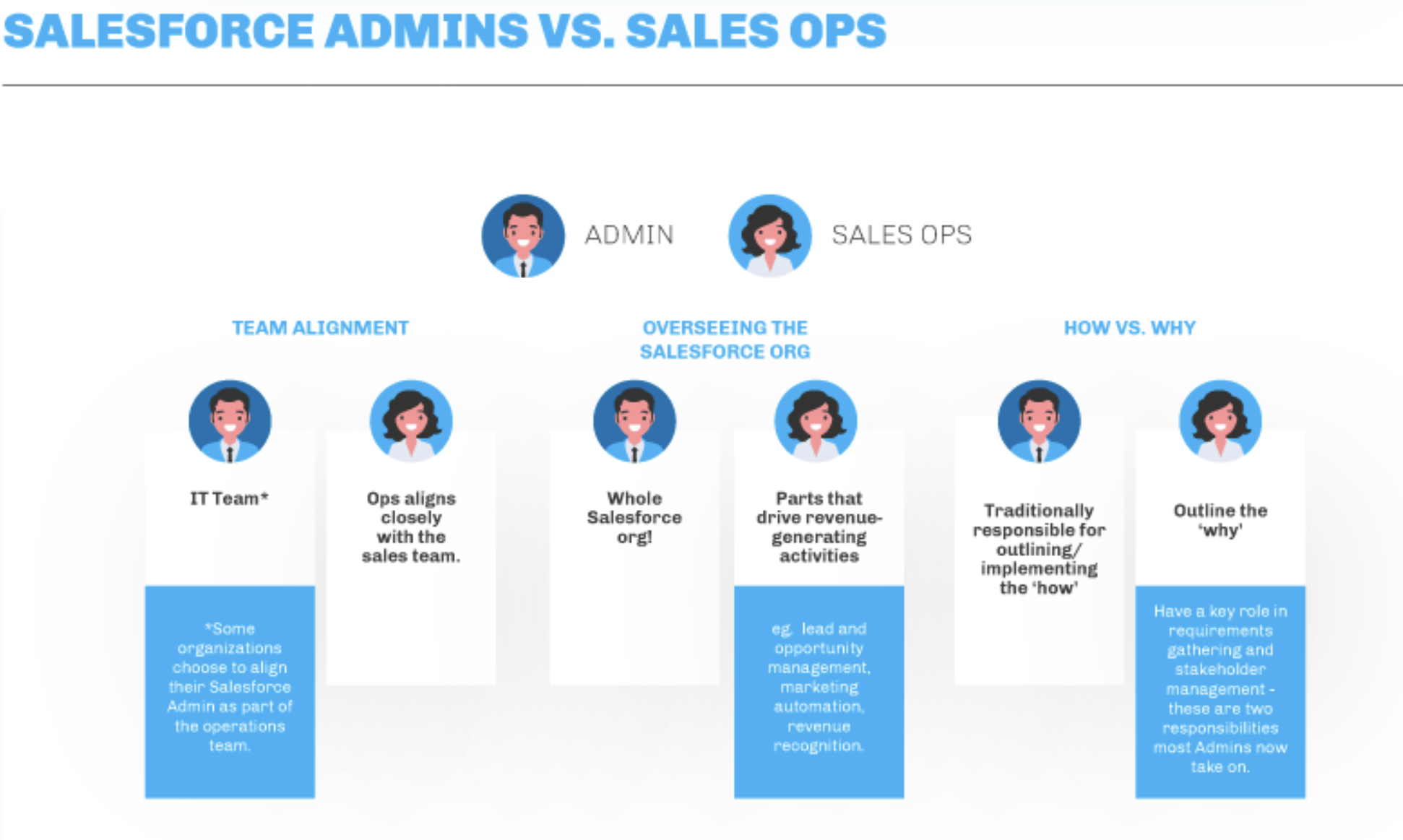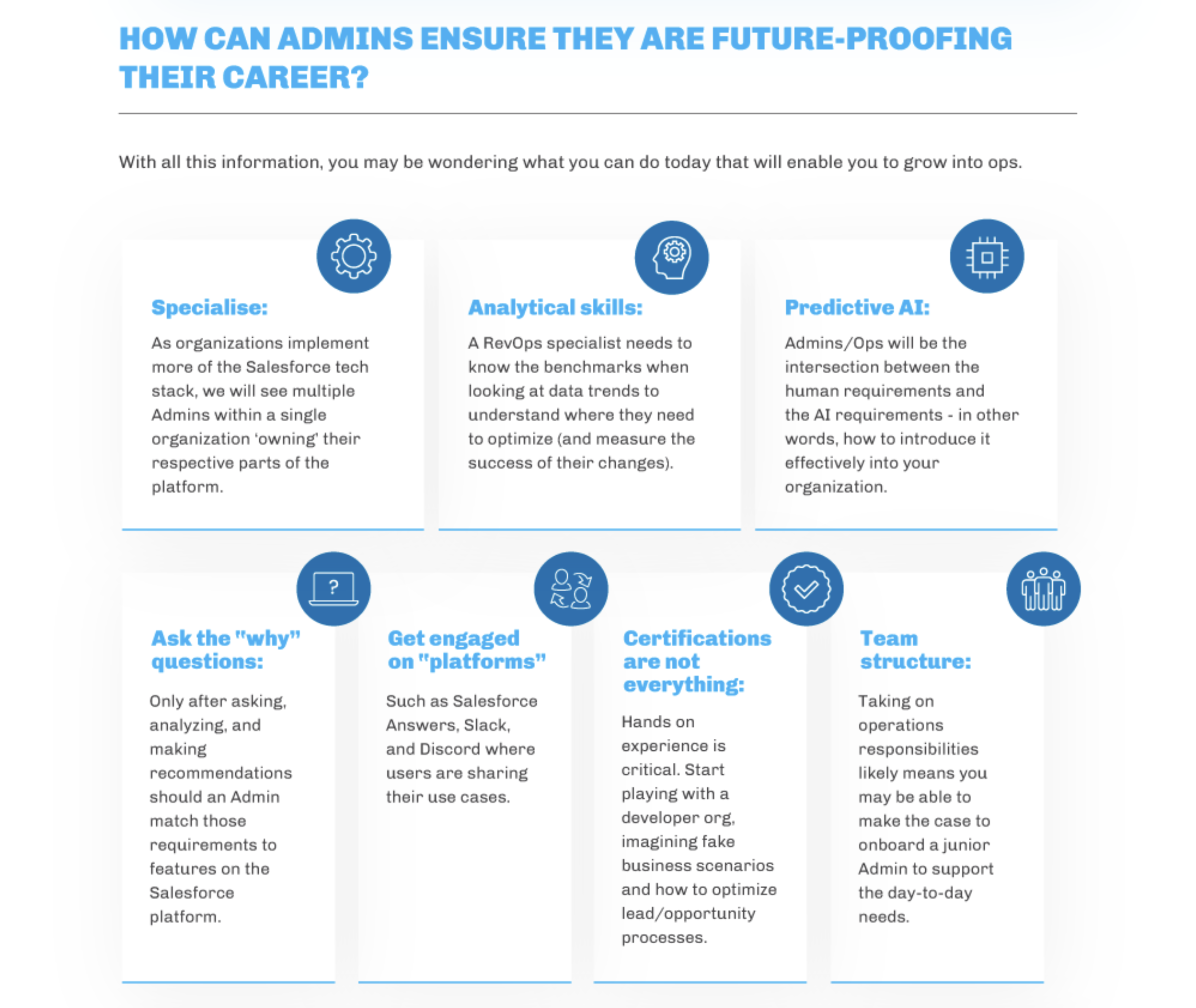Shifts in the Salesforce Admin role have been gaining attention in recent years, defining what a Salesforce Admin does has been a long-standing challenge. Admins often wear ‘many hats’ with responsibilities that vary depending on the organization they work for. This is particularly true in smaller organizations where a Salesforce Admin can quite easily find themselves taking on duties as a Business Analyst, Trainer, Tester, and more.
Why Ops, why now? The Sales Ops team works closely with the sales team to implement processes that enable them to sell more effectively and efficiently.
With Salesforce the lifeblood for most sales teams, it makes sense that Salesforce Admins are well-suited to a Sales Ops career, repackaging their deep knowledge of Sales Cloud and pairing it with commercial acumen. However, without a background in sales optimization, this is a transformation that doesn’t happen overnight for a typical Salesforce Admin. That being said, new expectations placed on Admins means many are stepping into an ops role – even if they aren’t fully aware of it.
“Is Ops the New Admin?” was a panel discussion, in partnership with Tenth Revolution Group, moderated by Dal Bamford, and featured Eric Dreshfield, Justice Sikakane, Andy Engin Utkan, and myself (plus an engaged audience who shared their valuable viewpoints). This article dives deeper into the points covered.
Has Salesforce’s evolution over the past 10 years changed the Admin role?
Short answer: a resounding yes.
Salesforce technology touches hundreds of thousands across the globe daily; you only need to take a peek at the IDC report to get an idea of Salesforce’s direct and indirect reach. If you think back 10 years, only a small fraction of people in the Salesforce ecosystem now would have been around back then.
In terms of technology, Salesforce had just started branching out from its core Sales Cloud and Service Cloud offerings. Take marketing automation, for example. Although marketing automation is a key part of overall CRM, it wasn’t even part of the Salesforce offering a decade ago. And of course, we are talking about a time before the crazy acquisition spree in 2016!
Salesforce’s growth, the speed and its scope, has without a doubt influenced the Admin’s role.
1. Expanding tech stacks:
As Salesforce grows its platform, an admin could be overseeing much more (not only new products but also new features within existing products). Additional responsibilities are dished out as customers buy and bolt-on more Salesforce products – or integrated products.
2. Endless customization capabilities:
While empowering for no-code admins, the challenge now is to configure Salesforce with purpose – and prioritize what will push the business forward.
3. Higher expectations from users:
Salesforce’s reputation as ‘best of breed’ has solidified. Instant gratification is the norm for users who interact with frictionless user experiences in all corners of their lives.
From ‘Switches and dials’, to Specialization
“The Admin was once the person who knew where all the ‘switches and dials’ were within Salesforce setup. While this remains important, with the growth of the platform, the biggest shift is in specialization – both within industries and products.” – Andy Engin Utkan
Example: Collaboration on the Salesforce Platform
Let’s use one expanding slice of the Salesforce tech stack as an example. ‘Collaboration’ was one theme the panelists honed in on, considering innovations around Quip, and shortly, Slack. The impact on user experience, how Salesforce will become even more entrenched in organisations, will contribute to what’s expected of Admins:
“We started with Chatter back in the day, with the view that it would remove email. It didn’t. The Slack acquisition completes the Salesforce vision of true collaboration, so this will fundamentally shift the role of admin.” – Eric Dreshfield
What do businesses now need, or expect, from their Salesforce Admin?
Short answer: an Admin unicorn with strong business acumen.
The momentum from Salesforce’s innovation has been met with another force: business expectations.
As organizations’ become ever more reliant on Salesforce, their desire to deliver results from their strategic investment grows, too. Salesforce’s effective marketing messaging sells the dream – someone has to deliver it. Enter today’s modern Admin.
Governance
“The Admin is starting to wear different hats – there is a governing role of how the platform is scaling and how that can impact the business within which it’s implemented – there is an evolution whereby the Admin should become the product owner.”
The Salesforce Admin/Analyst
“The role of the Admin should never be regarded as trivial. The role encompasses so much that it needs to be viewed as a strategic function, closer to a Business Analyst role.” – Eric Dreshfield
Commercial Acumen
“Admins should align more to the business. For example, from a Sales Cloud perspective, the responsibility of the Admin is to understand the commercial side – how the sales process goes, how the sales team works – that way, they work towards maximizing salesperson and customer effectiveness.” – Justice Sikakane
Is Sales Ops/RevOps a better description for the modern Admin’s responsibilities?
Short answer: Sales Ops/RevOps is a team/business function who work closely with the sales team to implement processes that enable them to sell more effectively and efficiently. This more closely describes the emerging Admin/Business Analyst blend.
Sales Operations and Revenue Operation intersecting with Admin responsibilities over the past few years has not gone unnoticed. This trend has been happening in tandem, or possibly as a result of, the Admin-Analyst.
Could this be one formula that got us to where we are now?
Salesforce Admin + Business Analyst skills + commercial acumen/sales optimization = Sales Ops/RevOps Specialist
Salesforce Admins vs. Sales Ops
Here is a basic (generalized) outline of the differences between Admins and Sales Ops/RevOps:
- Team alignment: it was common in the past for the Admin to sit within the IT team. Some organizations choose to align their Salesforce Admin as part of the operations team.
- Overseeing the Salesforce org: Admins work on the whole Salesforce org, whereas Sales Ops only concern themselves with parts of the Salesforce org that drive revenue-generating activities eg. lead and opportunity management, marketing automation, revenue recognition.
- How vs. why: Admins were traditionally responsible for outlining/implementing the ‘how’, rather than ops/analysts who would outline the ‘why’.
- Ops/analysts would play a role in requirements gathering and stakeholder management; these are two responsibilities most Admins now take on.
Overlapping Responsibilities
Vanessa Grant (from the audience) flagged the overlapping nature of multiple roles. Instead of co-existing, could they instead become a single role?
“Product Owner, RevOps, Admin, Analyst – all of these roles are starting to blend together and it’s incredibly confusing. How should these roles co-exist without everyone stepping on each other’s responsibilities?” – Vanessa Grant
So, yes, Ops could be the new Admin, however…
1. Realize the potential of Admins
More than one panelist pointed out that organizations don’t see the full potential of what their Admin can do. The job title can be deceptive, and often comes with an outdated job description that’s unnecessarily restrictive.
The Admin role should be elevated and respected in the first place – organisations need to understand that the Admin will have insights that are incredibly powerful.
2. Increasing Ops responsibilities requires support
While these are positive shifts, any additional expectations will require support eg. training to enable an Admin to successfully step up.
Another way the organization must support is to integrate the Admin-Ops role into all departments – in other words, it’s imperative that the role is not just dropped into the lap of operations, but is guaranteed buy-in and respect from relevant stakeholders around the business, especially in the eyes of sales leadership.
3. Move Fast, Don’t Break Stuff
With endless options to customize Salesforce at our fingertips, and more Salesforce products for businesses to sink their teeth into, the buzz around Salesforce grows. Businesses want to move faster – however, often it’s just more, more, more!
The Admin that has a deep understanding of Sales Ops will be indispensable in refocusing the development where it matters most. The importance of prioritization should not be underestimated to ensure that strategic goals are met and governance must be implemented to minimize nasties like technical debt.
How can Admins ensure they are future-proofing their career?
Short answer: there are key aspects of professional development that Admins can proactively pursue.
With all this information, you may be wondering what you can do today that will enable you to grow into ops. You’re not alone, it’s something that’s been on others’ minds – “Salesforce Admin to Sales Ops” tells the stories of how these Sales Ops professionals moved into the role, and advice they would give to Admins considering the same transition.
Read more: Salesforce Admin to Sales Ops: Where Can You Grow in the Salesforce World?
“Admins have always at least occasionally had to put on product owner, analyst, and ops hats, so it doesn’t sound like a challenging rebrand.” – Vanessa Grant
Here were the key insights from our panelists:
- Specialise: as organizations implement more of the Salesforce tech stack, we will see multiple Admins within a single organization ‘owning’ their respective parts of the platform.
- Analytical skills: RevOps is more focused on analytics, for example, a RevOps specialist needs to know the benchmarks when looking at reporting and trends in order to understand where they need to optimize, and ultimately measure the success of their changes.
- Predictive AI: especially as AI looks to automate more business processes, Admins/Ops will be the intersection between the human requirements and the AI requirements – in other words, how to introduce it into your organization effectively and what to do with AI once it’s been purchased.
- Ask the “why” questions: only after asking why, analyzing, and making recommendations should an Admin match those requirements to features on the Salesforce platform. It’s a mindset shift for some – get comfortable asking stakeholders “why”.
- Get engaged on platforms such as Salesforce Answers, Slack, and Discord where users are sharing their use cases. You will get better at analyzing business processes and requirements.
- Certifications are not everything: hands-on experience is critical. After browsing the platforms mentioned above, start playing with a developer org, imagining fake business scenarios and how to optimize lead/opportunity processes.
- Team structure: taking on operations responsibilities likely means your Admin workload becomes a burden that you can’t shoulder alone. Depending on the structure of the team you work within, and your organization’s perception of Salesforce’s value, you may be able to make the case to onboard a junior Admin to support the day-to-day needs of your users. By providing this resource, your organization is investing in you to accelerate their growth, with a long term perspective.
Final Thoughts
Aside from weighing up the Admin role, Ops, and everything ‘Salesforce’ that comes with that, the closing remarks were snippets of advice not strictly related to Salesforce, but relevant all the same:
- Have empathy – in ops, you need to understand people’s frictions, in order to become an ally with them. This will be effective to drive adoption in the team’s culture.
- If you’re struggling with career progression, stop viewing your potential next move from a product perspective. Instead, look to work for a company that interests you or aligns to your values. Growth and progression come in many guises.
- Get hands on experience by working with nonprofits on their Salesforce implementations (tips for pro bono work/volunteering in the Salesforce ecosystem).
- Balance home/work life – a reminder, especially in the current work world.








Comments: